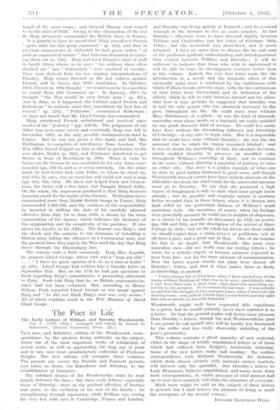The Poet in Life
Tins new, and definitive, edition of the Wordsworth 00ITC- sparklence, by the 'greatest living authority on the subject, forms one of the Most important works of scholarship of recent years, as well as superseding the long out of print and in any case most unsatisfactory collection of Professor Knight. The new edition will comprise three volumes. The present one covers the Penrith and Forncett periods, and takes us down, via Raeedown and Alfoxton, to the establishment at Grasmere.
The subdued drama of the Wordsworths must - be read largely between the lines ; but these early lettersespecially those of Dorothy—show us the gradual affection of brother and sister, to the . exclusion of the rest of the family ; its strengthening through separation, while William was sowing his very few wild oats in Cambridge, France and London, and Dorothy was living quietly at Forneett ; and its eventual triumph in the decision to live no more asunder. At first Dorothy's affections seem to have hovered slightly betWeen William and Christopher (see her letter of February 16th, 1793) ; but the hesitation was short-lived, and it never returned. I• have no space here to discuss the ins and outs of the profound spiritual understanding and interdependence that existed between William and Dorothy; • it will ' be
sufficient to indicate that those who wish to understand it will be able to trace its development nowhere better than .in this volume. Indeed, the very first letter reads like. the introduction •to a novel, and the dramatic effect of this outwardly quiet story is reinforced by the suddenness with which William breaks into the story, with the fine enthusiasm of that letter from Switzerland and its indication of the alTinity which he felt to exist between himself and his sister.• And here it may perhaps be suggested that Dorothy was in fact the only person who was absolutely necessary to the poet, throughout his life. He could have • done without Mary Hutchinson, at a pinch : he was the kind of intensely masculine man whose needs, as a husband, are easily satisfied by any good, domestic kind of woman. He could less easily have done without the stimulating influence and friendship of Coleridge—at any rate to begin with. But it is impossible that he could have done without Dorothy : she was the one constant star to which his wagon remained .hitched ; ;and. it was no doubt the knowledge of this, his absolute devotion,
whith enabled Dorothy to preserve an unruffled . calm throughout William's courtship of Mary, and to continue
in the same, without allowing a suspicion of jealousy to arise on either side. The story is a golden example of what can be done by good feeling harnessed to good sense, and though AVordsworth himself cannot have been entirely unaware of the difficulties involved; the chief credit for the .successful outcome must go to • Dorothy. To say that she possessed a high degree of imagination is only to state what most people know already ; but • its peculiar and exquisite nature is nowhere better revealed than in these letters, where it is thrown into high relief by the' pedestrian flatness of William's usual epistolary Style. On occasions, of course, when his feelings were 'powerfully aroused, he could rise to heights of eloquence, as is shown by his remarks on democracy (p. 119), on poetry (pp. 260 and 295), and the description of the arrival at Dove Cottage (p. 234) ; but on the whole his letters are those which we should expect from a rising lawyer or politician—not at all from a poet, and a great one at that. ' One of the reasons for this is, no doubt, that Wordsworth—like most very masculine men—did not really care for writing letters : • he wrote for a definite object, 'or because someone expected to hear from him—not for the mere pleasure of communication. Now the latter reason stands out plain from almost all Dorothy's letters, and that is what makes them so fresh, so interesting, so poetical.
" I have always felt at.Eitsernere, when I'have entered one of !the rooms without thinking of what was to be seen,7particularly when 1. had been there only a short time—that there. was something .ue- earthly in the prospect. So it scorned the last tithe. I was entirely occupied in the thought of you, and pist times, when I Went into the drawing room ; and, indeed, I think that I never before saw any sight that was so purely, so heavenly beautiful."
Wordsworth might well have expressed this experience in a• poem, but he would certainly never have confided it to a letter.' So that the general reader will derive most pleasure from Dorothy's letters, though the real Wordsworthian (and I am proud' to call myself one) will be hardly less fascinated by the 'stiffer and less easily observable unfolding of the poet's personality. • This volume contains a great quantity of new material, either in the shape of totally. unpublished letters or of those which had suffered from Knight's intolerable tinkering. Some of the new letters make dull reading : the • endless correspondence with Richard Wordsworth, for instance, which deals almost entirely with intricate money matters, will interest only the specialist. But Dorothy's letters to Lady Beaumont, hitherto unpublished, and. many more from
both correspondents, in which passages of vital interest had up to now been omitted, will claim the attention of everyone.
Much more might be said on 'the subject of these letters in general, but I shall reserve the pleasure of doing so until the emergence of the -second volume.
EDWARD SACRVILLE WEST.










































 Previous page
Previous page